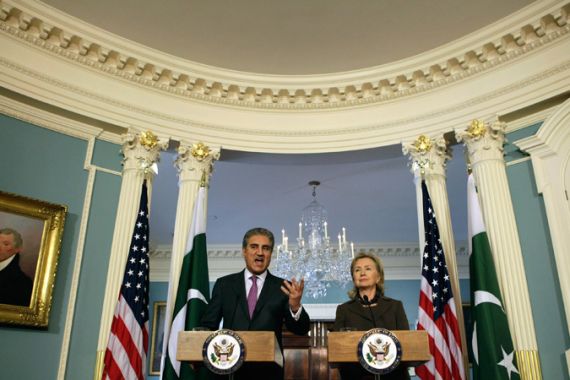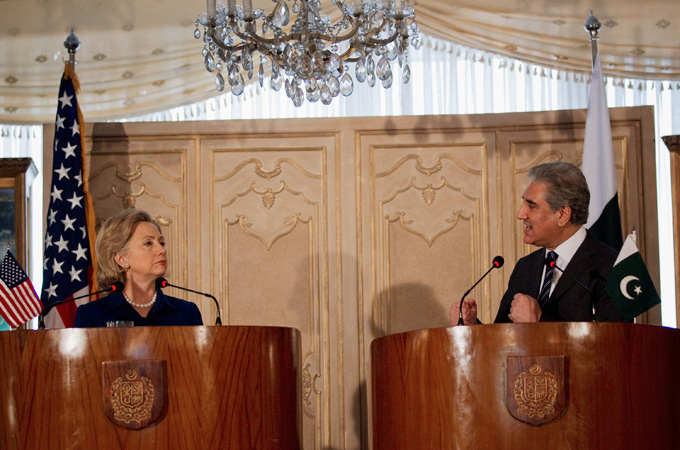A history of tragedy and farce
Do US-Pakistan relations prove the old adage that history repeats itself to be true?

 |
| Is history repeating itself in US-Pakistan relations? [GALLO/GETTY] |
It was Karl Marx who said that history repeats itself, first as tragedy, then as farce.
I have never really been sure what he meant. But as the recent history of US-Pakistan relations churns onward through multiple repetitive cycles, the results, while perhaps verging at times on black farce, have been clearly and consistently tragic. More tragic still, history seems poised to deliver yet more of the same.
As in all genuine tragedies, the protagonists in this drama are coming to grief not simply because of what they do, but fundamentally because of who they are. Their actions, and therefore their fate, are inevitable because it seems they cannot do otherwise.
I am not privy to the discussions conducted during the recently-held third iteration of the US-Pakistan Strategic Dialogue, but all indications are that the central talks did not go well. That is hardly a surprise. American frustrations with Pakistan are rising, primarily over two key issues: Pakistan’s continued unwillingness to invade the fervid extremist haven of North Waziristan; and its apparent refusal to take effective action against the leadership of the Afghan insurgency, which shelters on the Pakistani side of the Durand Line.
The two issues, of course, are linked. All else being equal, the Pakistanis would be more than happy to enter North Waziristan, if it were only a matter of sorting out a few dozen trouble-making al-Qaeda cadres. But they cannot do so without triggering yet more tribal resistance, further overstretching a military already overwhelmed by multiple insurgencies and a massive domestic disaster-relief effort. Beyond that, and strategic considerations regarding Afghanistan aside, they fear incurring the wrath of the so-called Haqqani network based in North Waziristan which, while currently focusing its efforts in Afghanistan, could easily shift course to combine efforts with the extremists of the Tehrik-e Taliban Pakistan, who have major Pakistani cities and the Pakistan army in their sights. The last thing the government of Pakistan needs is more, and more consolidated, enemies.
Betrayal, not opportunity
Pakistan’s inclination to resist US demands is reinforced further by its concerns over the future of Afghanistan, which in the Pakistani view seems destined for major political upheaval as the US executes a military withdrawal in the near- to medium-term. From Pakistan’s optic, maintaining a link with the insurgent elements which hold sway over Afghanistan’s Pashtuns is the only viable way to exert influence over a country which, if in the hands of non-Pashtun minorities, might otherwise provide India with the opportunity to effectively surround them.
To the Americans, who feel constrained to defend themselves by training airborne missiles on al-Qaeda extremists providing support to militants who have recently attempted terrorist outrages as far afield as New York City, while also suffering a sharp increase in casualties to their Afghan-based troops at the hands of Pakistan-based extremists, the Pakistani attitude seems treacherous, and a poor way of repaying billions of dollars in US generosity.
Nor do US attitudes appear to have shifted in light of current efforts to support reconciliation between the Karzai government and Pakistan-based insurgent leaders. In these circumstances, Pakistan’s latent ability to exert influence over the insurgents could be seen as a strategic asset; but to American eyes Pakistani dealings with the insurgents still constitute a betrayal, and not an opportunity.
The Americans’ frustration and distrust are very much shared on the Pakistani side. Pakistani officials resent that despite their years of counter-terrorism cooperation and heavy losses at the hands of militants inflamed by the US presence in Afghanistan, the Americans seem never to be satisfied. The threat of new attacks on the US emanating from Pakistan does not generate a greater sense of shared risk and solidarity, but instead inspires thinly-veiled American threats for having failed to do enough to stop them.
To these long-standing concerns are now added the fear that the Americans will try to exclude Pakistan from the nascent national reconciliation process in Afghanistan. Recent press reports cite Pakistani complaints that they are not informed as to which Taliban leaders are meeting with the Karzai government. Such officials make plain that they will not blindly support an Afghan peace process without assurances that their interests will be recognised and protected. The US attitude, as reflected in a recent statement by the US embassy spokesman in Islamabad, on the other hand, is that Pakistan must do precisely that. “The US believes that Pakistan’s role is to work in concert with the international community and support the Afghan government as it charts a course for the future,” he intoned.
Throat or feet
It appears the only way out of this morass would be for the US, acting in close conjunction with the Afghan government, to reach agreement with Pakistan on the broad outlines of an acceptable political solution in Afghanistan, as well as on the tough pressure which Pakistan must be prepared to exert upon both the Haqqani network and the Afghan Taliban’s so-called “Quetta Shura,” to either press the insurgent leadership into agreement, or to incentivise significant elements of the insurgency to break with their leadership.
Such an agreement would be a critical key to solving the compelling problems with Islamically-inspired violence and militancy – and ultimately the problem of al-Qaeda haven – on both sides of the Pakistan-Afghanistan border. Unfortunately, it would be nearly impossible for all sides to concur on a viable strategy, and even less likely that Pakistan could properly execute its agreed role in such a venture if they did.
Winston Churchill said of the Germans that they are “always either at your throat, or at your feet”. One imagines that Pakistani militants must have a similar view of the government of Pakistan. When the army is not engaged in brutal combat with extremist elements, it is negotiating agreements with them which are essentially capitulations in substance and largely unenforced in practice. That pattern of past behaviour provides little confidence that Pakistan could play a systematic and effective role in pressing a flexible and nuanced strategy to bring at least some substantial part of the Afghan insurgency into a political settlement.
In the immediately post-9/11 past, I had the unenviable role of trying to mediate between a US side which lacked empathy for legitimate Pakistani concerns, and thus tended to employ tactics which made Pakistan’s problems worse, rather than better; and a Pakistani side which would rather deny a problem until it became too big to ignore, and then seemed incapable of putting together and executing a sustained strategy to deal with it at that point. It is difficult to advocate for either side when both sides are wrong.
That pattern in US-Pakistan relations still persists. As they approach another such cycle, both countries would do well to contemplate the tragedy which history holds in store for those who fail to learn from it.
Robert Grenier was the CIA’s chief of station in Islamabad, Pakistan, from 1999 to 2002. He was also the director of the CIA’s counter-terrorism centre.
The views expressed in this article are the author’s own and do not necessarily reflect Al Jazeera’s editorial policy.